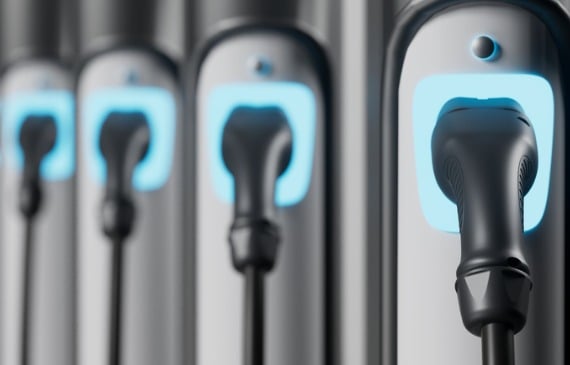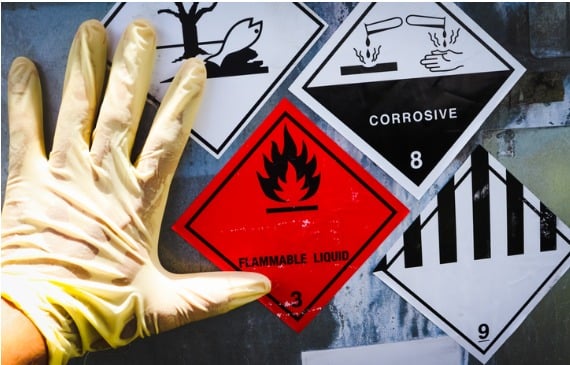In our fast-paced world, where technology keeps making leaps, it's clear going green and being kinder to the planet is part of the automotive industry. Electric vehicles (EVs) are front and center in this movement, a real game-changer for a cleaner future. Pepole are buying these nature-loving cars, picking them to slash carbon emissions and tackle that climate puzzle.
But as these electric champs take over the streets, towers need to be ready for a new set of challenges when it comes to parking these EV wonders. This blog article is all about laying out the potential hiccups that comes with electric vehicles and how towers can be prepared for the hazards associated with storing them.
In this article...
- Fire Hazards of Lithium-Ion Batteries
- Battery Degradation and Long-Term Storage
- Electrical Safety Considerations
- Environmental Concerns
- Top 12 Best Practices for Towers to Safely Haul & Store Electric Vehicles
- Finance Your Next Tow Truck for Safe EV Transportation
Fire Hazards of Lithium-Ion Batteries
Lithium-ion batterie, the heartbeat of modern electric vehicles (EVs), have revolutionized the automotive landscape with their high energy density and efficient power delivery. However, beneath their remarkable capabilities lies a potential hazard that demands our attention: the specter of thermal runaway.
Thermal Runaway and Thermal Management
Thermal runaway is a chain reaction of events within a battery cell that can escalate into a dangerous and uncontrollable release of energy, often resulting in fires or explosions. This phenomenon can be triggered by a range of factors, such as:
- Manufacturing defects
- Mechanical damage
- Exposure to extreme temperatures
- Overcharging
- And even internal short circuits.
During storage, these vulnerabilities are further exacerbated, as the EV batteries remain at rest but retain their inherent risks. Notably, instances of battery fires during storage have garnered attention, underscoring the need for vigilance in safeguarding these energy sources.

One chilling example involves a well-publicized incident in 2019, where a Tesla Model S caught fire while parked inside a residential garage in San Francisco, sparking a blaze that engulfed the house. This sobering event serves as a stark reminder of the importance of understanding and mitigating the hazards associated with EV battery storage, as the EV revolution charges forward.
Thermal Runaway Risks
Thermal runaway, a critical phenomenon in the realm of electric vehicle (EV) batteries, entails an uncontrolled and self-perpetuating increase in temperature within a battery cell, leading to a cascading chain reaction.
This hazardous process poses significant risks, including:
- The potential for battery fires
- Explosions
- Severe damage to the EV and its surroundings.
The importance of robust thermal management systems for EV storage cannot be overstated. These systems are designed to regulate and dissipate heat effectively, preventing excessive temperature buildup and mitigating the risk of thermal runaway. Inadequate temperature control can have dire consequences, ranging from compromised battery performance and reduced lifespan to catastrophic failures resulting in accidents and environmental hazards.

Tip: Store Electric Vehicles in a Temperature Controlled Area. The intimate relationship between thermal management and EVs underscores the necessity of advanced cooling and heating mechanisms to ensure the safe operation and longevity of electric vehicles, firmly establishing temperature control as a pivotal factor in the sustainable adoption of EV technology.
Battery Degradation and Long-Term Storage
Battery degradation in electric vehicles (EVs) is complex process that merits careful consideration for the long-term viability of these vehicles. Over time, as EV batteries undergo charging and discharging cycles, chemical reactions within the cells gradually lead to a reduction in their capacity and performance. This degradation is influenced by factors such as temperature, usage patterns, and charging practices.
Towers should be cautious about impact of long-term storage on EV battery health and the potential consequences. Extended periods of inactivity can exacerbate degradation, as the battery's state of charge can drift to either extreme, leading to increased stress on the cells and accelerating the degradation process.
To maintain battery health during extended storage periods, several tips are recommended.
- It’s crucial to store the EV in a cool and dry environment, ideally at a state of charge between 50-70%, which helps minimize stress on the cells.
- Utilizing a battery management system or setting the vehicle to a "storage mode" can help regulate the battery's state of charge and temperature.
- Periodic maintenance charges and occasional short drives can help ensure that the battery remains active and balanced, promoting overall longevity and performance.
By proactively managing battery health during long storage periods, towers can mitigate risks of working with electric vehicles.
Electrical Safety Considerations
The rise of electric cars (EVs) has changed how we travel, but it also means we need to be more careful about safety, especially when storing and charging these cars.
One big danger is getting an electric shock. Since EVs have a lot of energy in their batteries, not handling or taking care of them properly can put people at risk of getting shocked when the cars are being stored or charged.
To make things safer, it's really important to do things the right way. Having a special area for charging the cars with good materials and air flow helps prevent accidents. Also, paying close attention to how the cars are connected to the electricity and making sure they're well insulated lowers the chances of unexpected electrical problems. This shows how important it is to have strong and safe connections to the ground and prevent any extra electricity from escaping.
When you follow these safe steps, you're not only protecting yourself from electric shocks, but also making sure electric cars become an even safer and better way to travel.
Environmental Concerns
As electric cars become more popular as a cleaner option compared to regular cars with engines, people are becoming more aware of how they affect the environment. One worry is “What happens to the batteries in these electric cars when they're not used anymore?” These batteries are made up of different materials that can be tricky to deal with. If we don't get rid of them properly, they could make the ground and water dirty. Also, we need to be careful when we store these batteries because if we don't do it right, bad things might come out of them and harm the environment.
To fix these problems, we need to use smarter ways of handling old batteries. We can recycle the materials inside them to make new things and stop making a mess. Battery Recyclers of America provides next-day pickup of electric vehicle batteries in all 50 states. By doing these things, we can make sure electric cars are good for the environment not just now, but for a long time into the future.
Top 12 Best Practices for Towers to Safely Haul & Store Electric Vehicles
Considering the risks of moving electric vehicles, tow truck drivers should be especially careful of the following best practices.
- High Voltage Components: Electric vehicles contain high-voltage components, such as batteries and electric motors. Towing operators should be aware of the location of these components and avoid any actions that could damage or expose them. Accidental contact with high-voltage systems can lead to serious injuries or even fatalities.
- Disconnecting the Battery: Before towing, it's crucial to follow the manufacturer's guidelines for disconnecting the battery. This prevents the risk of electric shock and damage to the vehicle's electrical system.
- Proper Attachment: When attaching the tow truck's equipment to the EV, operators should follow the manufacturer's recommendations to avoid damaging sensitive components. Improper towing attachment points could lead to structural damage or affect the vehicle's balance during transport.
- Flatbed Towing: Whenever possible, electric vehicles should be transported using a flatbed tow truck. This eliminates the risk of damaging the EV's drivetrain, which can occur during towing with the wheels on the ground.
- Parking Brake and Transmission: Ensure the EV's parking brake is engaged, and the transmission is in "park" before towing. Some electric vehicles might have unique procedures for engaging these systems.
- Weight Distribution: Maintaining proper weight distribution on the tow truck is essential. Electric vehicle batteries are heavy, and improper loading can affect the stability of the tow truck.
- Secure Transport: Make sure the EV is securely fastened to the tow truck to prevent shifting during transport. This is especially important to prevent any damage to the vehicle.
- Cooling Systems: Electric vehicles often rely on cooling systems to manage battery temperature. If the vehicle has been involved in an accident or is not operational, the cooling system might be affected. Towing operators should be cautious about overheating issues.
- Storage Conditions: When storing an electric vehicle, avoid extreme temperatures (both hot and cold), as these can impact the battery’s performance and overall health. If possible, store EVs in a temperature-controlled environment with good ventilation. This helps prevent things from getting too hot and keeps the environment safe. It's also really important to be cautious about charging the cars in closed spaces, as this can create dangerous gases.
- Monitor the EV in Storage: Regular maintenance of the car batteries is a must, like checking for leaks or any problems with the battery. The storage areas should also be regularly checked to make sure everything is working safely, including the electrical systems and ways to stop fires.
- Training and Certification: Tow truck operators should receive proper training and certification for handling electric vehicles. They need to understand the unique aspects of EVs to ensure safe towing and storage practices.
- Emergency Response: In the event of an accident involving an electric vehicle, first responders should be aware of the vehicle's electric components and potential hazards. Manufacturers often provide guidelines for safely managing EVs in emergency situations. You should also make a clear fire safety plan to keep everyone safe and reduce risks.
Following these good practices and being ready for any situation helps make sure storing electric cars in towers is safe and secure for everyone.
Finance Your Next Tow Truck for Safe EV Transportation
Electric vehicles are changing the way people drive and what towers haul. It's important to remember that safety and progress work together. Tow truck drivers who want to add a flatbed tow truck to safely transport electric cars should consider tow truck financing.
Equipment financing is like a safety net, cushioning businesses during challenging economic times. Acquire the necessary equipment and technology needed to compete in the market, without making a large up-front investment.
By partnering with Beacon Funding, you can take on more EV towing jobs, increase your earning potential, and keep up with the evolving automotive landscape. Get the equipment you need sooner, pay for it over time, and generate revenue to cover your investment.
Getting the right equipment can help drivers do their job well and be part of the exciting shift to electric transportation. As we keep moving towards using more electric cars, towers will want to be equipped to handle the influx in EV hauls.
We're entering an exciting time of change! At Beacon Funding, we’re here to support your business growth and help you make the most of the opportunities in EV towing. Let us assist you in getting the perfect flatbed or wheel lift and dollies tow truck through our hassle-free financing process. Get in touch with us today and take your towing business to the next level!